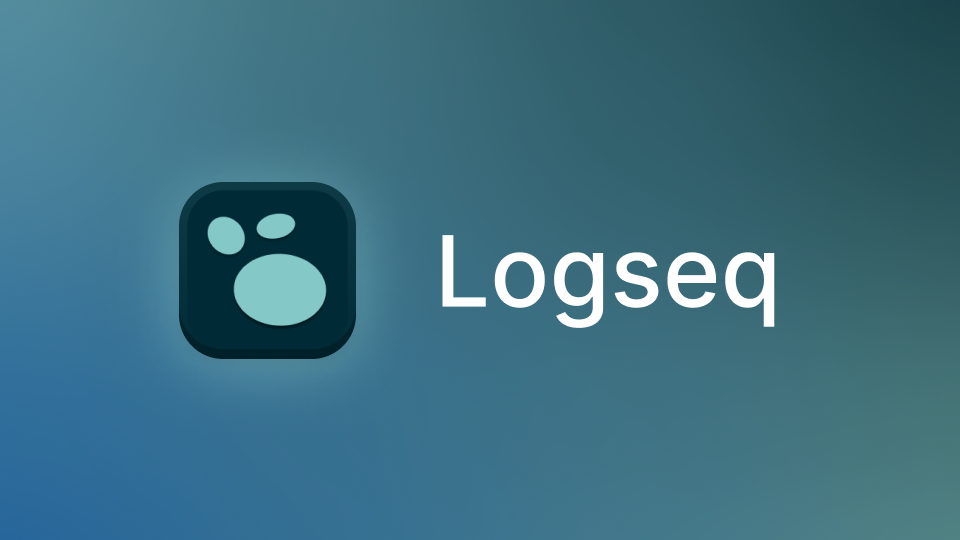cross-posted from: https://lemmy.one/post/197223
With everything going on with Twitter and Reddit I feel like I have a new appreciation for having my own local knowledge base in Logseq.
Have been using it for a year now. Its good, like it a lot. Mightn’t be for everyone (i.e. those who prefer long form text), there is a closed-source alternative called ObsidianMD (which is also very good)
I’ve been taking a lot of notes for ~16 years. When you write too many, they become write-only. It’s too difficult to sift through them to find nuggets you can synthesize into something else. I’ve tried structuring my notes after writing them, but this becomes remarkably time consuming and difficult to do unless you are extremely diligent about how frequently you do it.
You’ve got to structure your notes as you write them, and LogSeq makes this easy.
I still take a lot of notes via “Note to self” in a messaging app; I don’t use the LogSeq mobile app because of some opinions I have around syncing (if you pay, you can sync, but I want full ownership of my notes and to trust that they are private). However it’s just a copy-and-paste for me, because I’ve got my hashtag structure figured out mostly.
I have a couple tips for new users:
Use hashtags - but not indiscriminately.
It might take you some time to find the “themes” of your notes, before you’ve really wrapped your head around it you might just pepper hashtags everywhere. Eventually it becomes pretty clear. Use them diligently and later when you get fancy with search and queries you’ll be glad you did.
Don’t write massive blocks.
Separate larger thoughts in the outliner - sub-thoughts, parallel thoughts. Make child blocks. Remember that child blocks inherent the tags of their parent blocks, so don’t repeat tags in child blocks or the search results will get messy. When you come to a conclusion, hide your evidence and reasoning under your conclusion for future reference.
Interesting, thanks for this! I’ve got a reasonably sized wiki I exported from TiddlyWiki into Obsidian and it works alright; but now I’m curious if Logseq would be a better fit. All my daily and review entries in TiddlyWiki were bullet-pointed, so it should feel natural in that respect.
I tried tons of personal knowledge management apps and eventually settled with Logseq. It’s incredible if you’re more of an outliner, the workflow just fits me like a glove. I just dump everything into daily journals and let the connections arise from there as I go.
My one big complaint is you can’t self host a self contained web version of it (meaning you still have to open a local working folder even if you do host your own, which defeats the purpose imo), which then forces you to either sync between devices manually or use their paid service. Since there are Windows and Android apps I make do with Syncthing, but it’s unnecessarily clunky.This looks good. I use notion, and have used obsidian, I think if something could take the best of both and make it OSS it’d be killer.
+1 for logseq, been using it for a year now. I really like how active the development is. It is already a nice note taking app, now whiteboards were added as well.
I’ve been turned on to Notion by work, and now use it for my lil’ polycule as well — but I do want something … better.
Unfortunately both logseq and Obsidian have way, way too much of a “text” focus for me, even with plugins; and way too little of a “data” focus — the real potential strength of Notionalikes is definitely in deep database features and integration; not ‘this is only useful if you type at a full keyboard for hours.’ At least to me. 🤣
I’m pretty excited about http://anytype.io; but it’s in perpetual development/beta — still kinda barebones. It’s definitely got the correct focus, though? Chunks of data, not “articles” or “pages!”
I’ve been trying the AnyType beta on/off, but it never really stuck with me. Maybe I’m just too entrenched in Notion…
I have been going between this and Obsidian for a bit now. I do like outliners, but at some point I decided that a collection of markdown files is more future proof, and Obsidian is more suitable to that structure.
I’ve been looking into Logseq and Joplin over the last week or so, trying to figure out how I want to migrate away from Evernote since they are massively increasing their prices.
What I like about Logseq and Joplin both is that at their core it’s just Markdown files and you can sync them around in a number of different ways however you feel like, including self-hosting, various cloud providers, or locally and securely via syncthing (which is what I chose). With syncthing the content of the notes is never exposed during transit and it’s never stored anywhere I don’t control.
At the moment I’ve moved almost entirely over to Joplin since it’s pretty close to Evernote, but I do plan on trying to use Logseq and see how I like its journaling/block tagging type approach.
I use Logseq as well, and I love it. Something about journaling bullet points fits me so well and feels natural. But, templating system is a bit clunky, the app is rather unstable (do enable
gittracking or you might lose your notes), themes/plugins quickly get out of sync and to fully power-use it you need to know Clojure programming lanugage (I don’t and I’m missing out powerful filters).But, all data is in simple markdown files, so we are not locked in.
❤️ Logseq If you’re into selfhosting, they have a very easy to use GitHub action that generates a spa from your graph.








